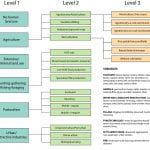Mission and Scope
Dr. Kathleen Morrison, Principal Investigator
The Penn Paleoecology Lab is dedicated to the analysis of human-environment interactions across the later Holocene. Our approach combines data and methods from archaeology, history, and the earth and environmental sciences. The latter includes analysis of pollen, phytoliths, sediments, plant macroremains including wood, and stable isotopes. We are also interested in how records and imaginations of past landscapes continue to structure the present, specifically regarding issues of irrigation and water management, agriculture, conservation, and biodiversity.
The laboratory opened for research in August of 2019. It is well equiped for the microscopic analysis of plant remains (seeds, wood charcoal and thin sections, phytoliths, pollen). The lab includes wet chemical facilities for the extraction of phytoliths and pollen, and for isotopic sample preparation (animal bone and plant remains). Our comparative reference collections of seeds, wood, pollen, and phytoliths cover a diversity of flora from South Asia, the Near East, the Mediterranean, South American, and Central America (particularly the east coast).
The lab is a busy place, with analysis of material from around the world in progress. Although most of our research focuses on South Asia, graduate student and postdoctoral projects have included analysis of plant material, sediments, and artifacts from Cambodia, Mexico, New Mexico, Yemen, Turkey, Sudan, Russia, Cambodia, Oman, and Nova Scotia.
Current Lab Research Projects
- Early Historic Landscapes of the Tungabhadra Corridor
- The Expansion of Rice Farming
- Mudumalai
- LandCover6K
- Northern Virginia Maritime Landscapes
Early Historic Landscapes of the Tungabhadra Corridor
Northern Virginia Maritime Landscapes

To learn more about Green Labs, click here.




